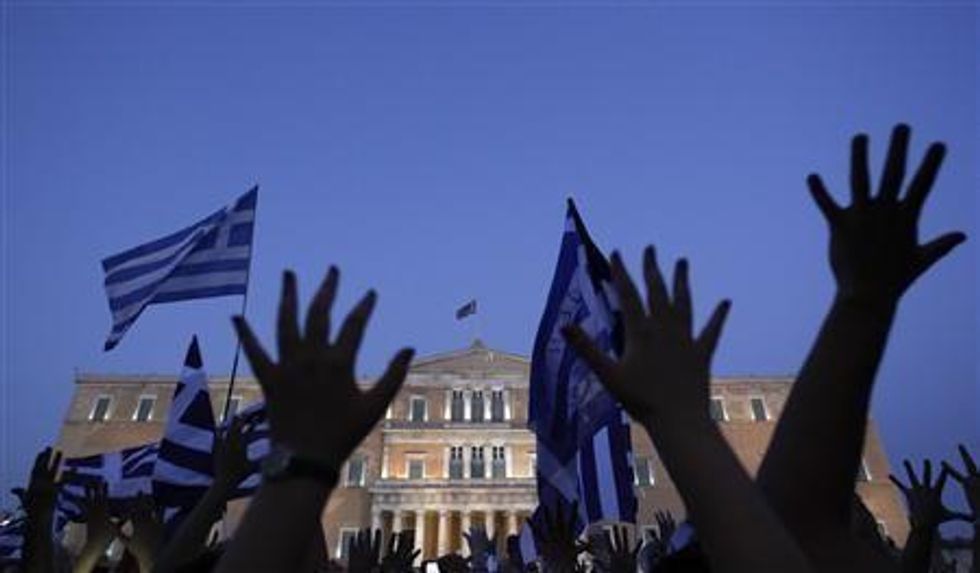Alternative Media Outlets Launch Counter-Attack on Greek Austerity
'We don’t want listeners, we want citizens'

"Although their audiences are still relatively modest, they are playing an increasingly vital role in the conversation," read the New York Times article, describing alternative outlets such as the left-leaning Radio Bubble, an independent radio station/public meeting house, and new investigative journalism publications such as 'Unfollow' and 'The Press Project' which have been critical of the austerity policies of President Antonis Samaras and his ruling coalition government.
From the Times:
Even before the economic crisis hit, polls showed that Greeks lacked trust in the mainstream news media almost as much as they lacked it in politicians, seeing both as intertwined in a kind of crony capitalism that helped push the country to bankruptcy.
Now, four years into the crisis, Greeks are even more skeptical of mainstream news organizations and even hungrier for information from nontraditional sources, especially if it veers from the government's line that Greece has no alternative to the austerity policies demanded by its foreign lenders.
As the profile of this new media landscape shows, one of the silver linings of the painful economic realities of life under austerity has been the degree to which positive forces and alternative models have stepped into the gap created by public cuts and a depressed economy. For some in Greece, these emerging alternatives represent the best source of hope that a nation battered by financial elites is on the path to reclaiming its democracy.
As Apostolis Kaparoudakis, founder of Radio Bubble, declared: "We don't want listeners, we want citizens."
_______________________
An Urgent Message From Our Co-Founder
Dear Common Dreams reader, The U.S. is on a fast track to authoritarianism like nothing I've ever seen. Meanwhile, corporate news outlets are utterly capitulating to Trump, twisting their coverage to avoid drawing his ire while lining up to stuff cash in his pockets. That's why I believe that Common Dreams is doing the best and most consequential reporting that we've ever done. Our small but mighty team is a progressive reporting powerhouse, covering the news every day that the corporate media never will. Our mission has always been simple: To inform. To inspire. And to ignite change for the common good. Now here's the key piece that I want all our readers to understand: None of this would be possible without your financial support. That's not just some fundraising cliche. It's the absolute and literal truth. We don't accept corporate advertising and never will. We don't have a paywall because we don't think people should be blocked from critical news based on their ability to pay. Everything we do is funded by the donations of readers like you. Will you donate now to help power the nonprofit, independent reporting of Common Dreams? Thank you for being a vital member of our community. Together, we can keep independent journalism alive when it’s needed most. - Craig Brown, Co-founder |

"Although their audiences are still relatively modest, they are playing an increasingly vital role in the conversation," read the New York Times article, describing alternative outlets such as the left-leaning Radio Bubble, an independent radio station/public meeting house, and new investigative journalism publications such as 'Unfollow' and 'The Press Project' which have been critical of the austerity policies of President Antonis Samaras and his ruling coalition government.
From the Times:
Even before the economic crisis hit, polls showed that Greeks lacked trust in the mainstream news media almost as much as they lacked it in politicians, seeing both as intertwined in a kind of crony capitalism that helped push the country to bankruptcy.
Now, four years into the crisis, Greeks are even more skeptical of mainstream news organizations and even hungrier for information from nontraditional sources, especially if it veers from the government's line that Greece has no alternative to the austerity policies demanded by its foreign lenders.
As the profile of this new media landscape shows, one of the silver linings of the painful economic realities of life under austerity has been the degree to which positive forces and alternative models have stepped into the gap created by public cuts and a depressed economy. For some in Greece, these emerging alternatives represent the best source of hope that a nation battered by financial elites is on the path to reclaiming its democracy.
As Apostolis Kaparoudakis, founder of Radio Bubble, declared: "We don't want listeners, we want citizens."
_______________________

"Although their audiences are still relatively modest, they are playing an increasingly vital role in the conversation," read the New York Times article, describing alternative outlets such as the left-leaning Radio Bubble, an independent radio station/public meeting house, and new investigative journalism publications such as 'Unfollow' and 'The Press Project' which have been critical of the austerity policies of President Antonis Samaras and his ruling coalition government.
From the Times:
Even before the economic crisis hit, polls showed that Greeks lacked trust in the mainstream news media almost as much as they lacked it in politicians, seeing both as intertwined in a kind of crony capitalism that helped push the country to bankruptcy.
Now, four years into the crisis, Greeks are even more skeptical of mainstream news organizations and even hungrier for information from nontraditional sources, especially if it veers from the government's line that Greece has no alternative to the austerity policies demanded by its foreign lenders.
As the profile of this new media landscape shows, one of the silver linings of the painful economic realities of life under austerity has been the degree to which positive forces and alternative models have stepped into the gap created by public cuts and a depressed economy. For some in Greece, these emerging alternatives represent the best source of hope that a nation battered by financial elites is on the path to reclaiming its democracy.
As Apostolis Kaparoudakis, founder of Radio Bubble, declared: "We don't want listeners, we want citizens."
_______________________

